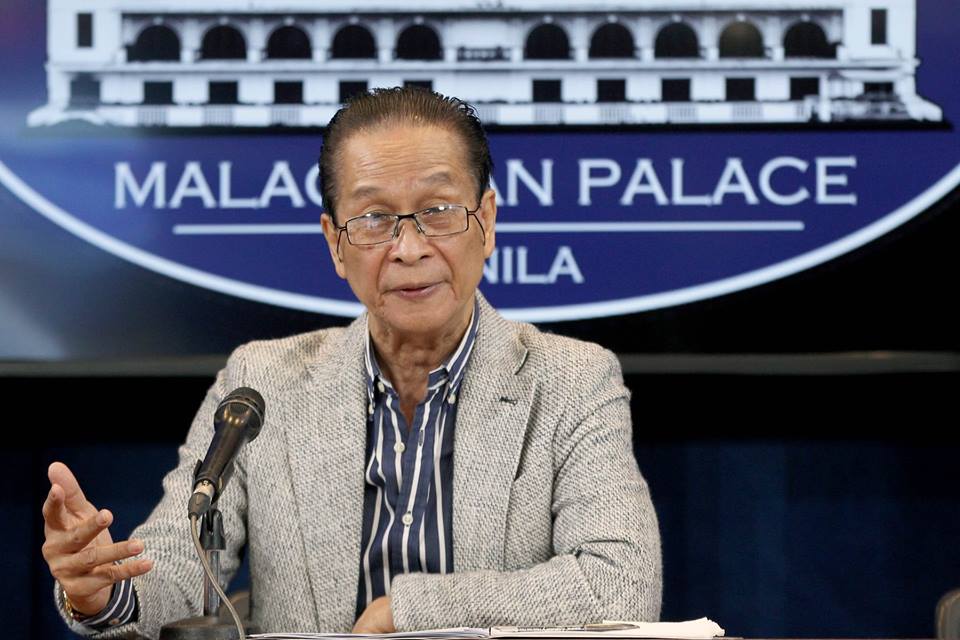News
VFA termination won’t affect PH security deals with US

Presidential Spokesperson Salvador Panelo said terminating the VFA is not tantamount to abandoning the Philippines’ defense and security cooperation with the US. (File Photo: Office of the Presidential Spokesperson/Facebook)
MANILA – President Rodrigo Duterte’s plan to scrap the Visiting Forces Agreement (VFA) with the United States would not have an adverse impact on other existing agreements aimed at boosting military alliance between Manila and Washington, Malacañang clarified on Sunday.
Presidential Spokesperson Salvador Panelo said terminating the VFA is not tantamount to abandoning the Philippines’ defense and security cooperation with the US.
“‘Yung VFA lang naman ang mate-terminate (It’s just the VFA that will be terminated). So there is nothing to speculate about alliance natin with the (United) States. Ganoon pa rin. Wala namang mababago (It stays the same. Nothing will change),” Panelo said in an interview with dzIQ.
“Nandoon pa rin. Hindi naman mababago yun. ‘Yung VFA lang naman ang pinag-uusapan (The other agreements still exist. Nothing will change. We’re just talking about the VFA),” he added.
Apart from VFA, the Philippines has other existing pacts with the US, which include the 1947 Military Assistance Agreement, the 1951 Mutual Defense Treaty (MDT), and the 2014 Enhanced Defense Cooperation Agreement (EDCA).
The Military Assistance Agreement created the joint US Military Assistance Group to advise and train the Armed Forces of the Philippines.
Meantime, the 1951 MDT seeks to boost the defense and security cooperation between Manila and Washington, while the 2014 EDCA aims to boost military ties in maritime security and domain.
On Thursday, Duterte threatened to terminate the VFA between the Philippines and the US within one month, in case Washington fails to “correct” the cancellation of Senator Ronal dela Rosa’s US visa.
The VFA, signed by Manila and Washington on Feb. 10, 1998, gives US forces the privilege to enter the Philippines sans passport and visa restrictions, as well as to use their permits and licenses in the host country.
Under the VFA, the US also keeps jurisdiction over its military when they commit crimes in the Philippines, unless these are punishable in Manila.
The Philippines can revoke the VFA by notifying the US of its intent to terminate the agreement.
More beneficial to US than to PH
Panelo defended Duterte’s planned termination of the VFA, as he stressed that the agreement was more advantageous to the US than to the Philippines.
“It’s a privilege granted to a military personnel of the US. More on them than to us,” he said. “Kapag na-terminate, yung mga pribilehiyo ng mga Amerikanong military, mawawala na (The termination of VFA will strip the personnel of American military of privilege).”
Panelo reiterated that the process to terminate VFA has already started.
He, however, could not say if there is a possibility that Duterte might change his mind about the revocation of VFA, in the event that Washington grants dela Rosa a US visa.
“Isa lang yun sa mga dahilan. So kung isa lang yun sa mga dahilan, hindi natin alam kung makakaapekto iyan sa mga desisyon niya. (The cancellation of Dela Rosa’s visa is just one of the reasons. So if that’s just one of the reasons, we don’t know if it can affect his decisions),” Panelo said.
“Dahil ang desisyon niya (Duterte) ay batay sa pag-labag sa ating kasarinlan. Kasama na rin ‘yung hindi paggalang (His decision was based on the US’ ignorance of the Philippines’ sovereignty),” he added.
Duterte’s relationship with Washington has apparently turned sour after US President Donald Trump signed the US 2020 budget, which includes a provision that authorizes US Secretary of State Mike Pompeo to prevent Philippine officials involved in Senator Leila de Lima’s detention from entering the US.
De Lima has been detained at the Philippine National Police (PNP) Custodial Center at Camp Crame in Quezon City since February 2017 due to her supposed role in the drug proliferation inside the national penitentiary during her stint as Justice secretary.





















